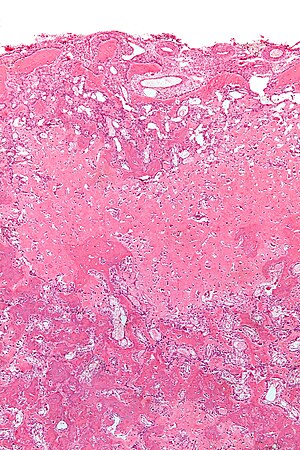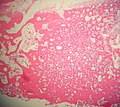Difference between revisions of "Osteoblastoma"
Jump to navigation
Jump to search
(→Images) |
|||
| Line 22: | Line 22: | ||
| Prevalence = | | Prevalence = | ||
| Bloodwork = | | Bloodwork = | ||
| Rads = > | | Rads = often >=2.0 cm (similar lesions 1-2 cm may be [[osteoid osteoma]]), often well-circumscribed, +/-cortical expansion, +/-cortical destruction | ||
| Endoscopy = | | Endoscopy = | ||
| Prognosis = benign, may be locally destructive | | Prognosis = benign, may be locally destructive | ||
| Line 40: | Line 40: | ||
*Bone. | *Bone. | ||
**Vertebral column and sacrum - most common in one large series.<ref name=pmid8119712>{{Cite journal | last1 = Lucas | first1 = DR. | last2 = Unni | first2 = KK. | last3 = McLeod | first3 = RA. | last4 = O'Connor | first4 = MI. | last5 = Sim | first5 = FH. | title = Osteoblastoma: clinicopathologic study of 306 cases. | journal = Hum Pathol | volume = 25 | issue = 2 | pages = 117-34 | month = Feb | year = 1994 | doi = | PMID = 8119712 }}</ref> | **Vertebral column and sacrum - most common in one large series.<ref name=pmid8119712>{{Cite journal | last1 = Lucas | first1 = DR. | last2 = Unni | first2 = KK. | last3 = McLeod | first3 = RA. | last4 = O'Connor | first4 = MI. | last5 = Sim | first5 = FH. | title = Osteoblastoma: clinicopathologic study of 306 cases. | journal = Hum Pathol | volume = 25 | issue = 2 | pages = 117-34 | month = Feb | year = 1994 | doi = | PMID = 8119712 }}</ref> | ||
* | *Size important as per WHO definition:<ref name=pmid25224389>{{Cite journal | last1 = Yalcinkaya | first1 = U. | last2 = Doganavsargil | first2 = B. | last3 = Sezak | first3 = M. | last4 = Kececi | first4 = B. | last5 = Argin | first5 = M. | last6 = Basdemir | first6 = G. | last7 = Oztop | first7 = F. | title = Clinical and morphological characteristics of osteoid osteoma and osteoblastoma: a retrospective single-center analysis of 204 patients. | journal = Ann Diagn Pathol | volume = 18 | issue = 6 | pages = 319-25 | month = Dec | year = 2014 | doi = 10.1016/j.anndiagpath.2014.08.006 | PMID = 25224389 }}</ref> ‡ | ||
*>= 2.0 cm: osteoblastoma. | |||
*<=1.0 cm: [[osteoid osteoma]]. | |||
*>1 cm and <2 cm: clinical and radiologic criteria should be considered. | |||
Note: | |||
*‡1.5 cm is a [[diagnostic size cutoff]] seen in older references.<ref name=Ref_Sternberg4_286>{{Ref Sternberg4|286}}</ref> | |||
===Radiology=== | ===Radiology=== | ||
Revision as of 21:02, 23 February 2016
| Osteoblastoma | |
|---|---|
| Diagnosis in short | |
 Osteoblastoma. H&E stain. | |
|
| |
| LM | anastomosing bony trabeculae with variable mineralization, osteoblastic rimming, no nuclear atypia of osteocytes |
| LM DDx | osteoid osteoma, osteosarcoma |
| Site | bone - vertebral column typically, other bones |
|
| |
| Clinical history | usu. 15-20 years old, males > females |
| Symptoms | usu. pain |
| Radiology | often >=2.0 cm (similar lesions 1-2 cm may be osteoid osteoma), often well-circumscribed, +/-cortical expansion, +/-cortical destruction |
| Prognosis | benign, may be locally destructive |
| Clin. DDx | osteosarcoma |
Osteoblastoma is benign primary bone tumour. It is grouped with the chondro-osseous tumours.
General
- Benign bone tumour - that can be locally destructive and occasionally recurs.[1]
- Uncommon.[2]
- Typically age 15-20 and male (male:female = ~2:1).[3]
- Very large age range.[1]
- Treatment: resection.[3]
Gross
- Bone.
- Vertebral column and sacrum - most common in one large series.[1]
- Size important as per WHO definition:[4] ‡
- >= 2.0 cm: osteoblastoma.
- <=1.0 cm: osteoid osteoma.
- >1 cm and <2 cm: clinical and radiologic criteria should be considered.
Note:
- ‡1.5 cm is a diagnostic size cutoff seen in older references.[5]
Radiology
Features:
- Often well-circumscribed, +/-cortical expansion, +/-cortical destruction.[1]
Note:
- May be described as malignant by radiology.[1]
Microscopic
Features:[6]
- Anastomosing bony trabeculae with:
- Osteoblastic rimming.
- Cells line-up at edge of bone.
- Osteoblastic rimming.
Notes:
- Histomorphologically near identical/indistinguishable from osteoid osteoma.[5]
DDx:
Images
Sign out
BONE, LEFT FEMUR, EXCISION: - OSTEOBLASTOMA.
See also
References
- ↑ 1.0 1.1 1.2 1.3 1.4 1.5 Lucas, DR.; Unni, KK.; McLeod, RA.; O'Connor, MI.; Sim, FH. (Feb 1994). "Osteoblastoma: clinicopathologic study of 306 cases.". Hum Pathol 25 (2): 117-34. PMID 8119712.
- ↑ Khan, IS.; Thakur, JD.; Chittiboina, P.; Nanda, A.. "Large sacral osteoblastoma: a case report and review of multi-disciplinary management strategies.". J La State Med Soc 164 (5): 251-5. PMID 23362588.
- ↑ 3.0 3.1 Villalobos, CE.; Rybak, LD.; Steiner, GC.; Wittig, JC. (2010). "Osteoblastoma of the sternum--case report and review of the literature.". Bull NYU Hosp Jt Dis 68 (1): 55-9. PMID 20345366.
- ↑ Yalcinkaya, U.; Doganavsargil, B.; Sezak, M.; Kececi, B.; Argin, M.; Basdemir, G.; Oztop, F. (Dec 2014). "Clinical and morphological characteristics of osteoid osteoma and osteoblastoma: a retrospective single-center analysis of 204 patients.". Ann Diagn Pathol 18 (6): 319-25. doi:10.1016/j.anndiagpath.2014.08.006. PMID 25224389.
- ↑ 5.0 5.1 Mills, Stacey E; Carter, Darryl; Greenson, Joel K; Oberman, Harold A; Reuter, Victor E (2004). Sternberg's Diagnostic Surgical Pathology (4th ed.). Lippincott Williams & Wilkins. pp. 286. ISBN 978-0781740517.
- ↑ Mills, Stacey E; Carter, Darryl; Greenson, Joel K; Oberman, Harold A; Reuter, Victor E (2004). Sternberg's Diagnostic Surgical Pathology (4th ed.). Lippincott Williams & Wilkins. pp. 285. ISBN 978-0781740517.





